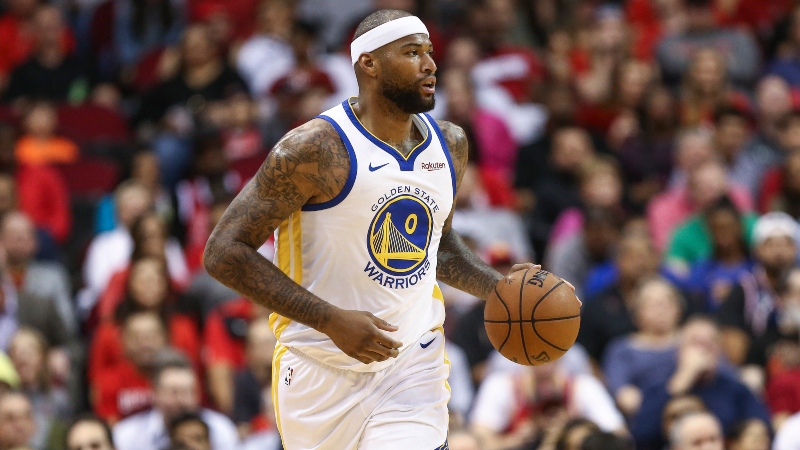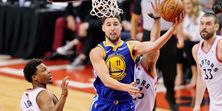How DeMarcus Cousins Has Turned into the Warriors’ X-Factor
Photo Credit: Troy Taormina-USA TODAY Sports. Pictured: DeMarcus Cousins
- It seemed that DeMarcus Cousins, a high-usage big man, wouldn't be a good fit with the "Strength in Numbers" Warriors.
- In Game 2 of the NBA Finals, however, he showed his value to this team and proved to be one of their biggest X-factors.
- Rob Perez (@WorldWideWob) and Matt Moore (@HPBasketball) discuss how it happened and what it means moving forward.
Wob:He was almost unplayable.
I know that reads as an egregious exaggeration without any context, but at several points throughout the playoffs it felt like there were multiple instances in which we were asking ourselves, “Why is DeMarcus Cousins on the floor right now?”
This has absolutely nothing to do with Boogie’s talent, as a matter of fact: He’s shown plenty of flashes of his old All-Star self — the bucket-getting basketball Godzilla who lays waste to any mere mortal in his path — despite a devastating Achilles injury and most recently a ruptured quadricep.
This declaration revolves around Cousins’ style of play and how his contributions to the offense felt like trying to jam a square block through a circle hole — at some point it’s going to happen if you keep forcing it, but not before its shape is altered beyond repair.
He’s a ball-stopper. That is not an insult; some of the game’s all-time greats are and/or were ball-stoppers: Kobe Bryant, Allen Iverson, Michael Jordan, Kevin Durant, just to name a few. When you’re as good of a scorer as these names are known to be, the offense revolves around you. Isolation is more times than not a mismatch; thus, they exploit it.
But here’s the thing: DeMarcus Cousins is teammates with one of the names listed above. When you have two ball-stoppers on the court at the same time, take a wild guess as to what happens next — the ball really stops moving. Even on the Golden State Warriors, one of the most high-speed, sharing, efficient offenses in NBA history, whose dynastic core motto was “Strength in Numbers."
There is only one ball on the court, and the numbers don’t lie: When DeMarcus Cousins has been on the floor during the playoffs, the Warriors have recorded an eye-popping -6.1 Net Rating. Without him, that number does an exact 180-degree turn, updating to +6.1. As for the Durant/Cousins lineup specifically, the Warriors have posted a -17.8 Net Rating with them together in the playoffs.
On paper and in the film room, it was hard to foresee a way in which this relationship of Boogie’s style and the Golden State war machine could find a happy medium against a championship-caliber opponent.
But then Durant got hurt.
With Cousins returning for Game 1 of the Finals and KD still on the mend, everything has appeared to change (with the caveat of the sample size being only two games).
Following an impressive Game 2, one which saw Cousins record 11 points, 10 rebounds, six assists and two blocks in 27 minutes of play, head coach Steve Kerr reiterated just how vital Boogie’s performance was:
“He was great. We came in thinking, ‘All right, he can maybe play 20 minutes,’ and he gave us almost 28. There was only one time in the game when he needed a rest, which was mid-fourth, and we gave him a couple minutes and then got him back in the game. But he was fantastic, and we needed everything he gave out there — his rebounding, his toughness, his physical presence, getting the ball in the paint, and just playing big, like he does. We needed all of that.”
To the common eye, Cousins’ stat line was far from one of those unfathomable James Harden box scores or something you’d see from a scorned Russell Westbrook out for revenge. But with Kevon Looney in the locker room getting X-rays, Klay Thompson out with a hamstring injury, Steph battling headaches and just about every other active Warrior dealing with something that they'd go to the nurse for to get out of a pop quiz — it was DeMarcus Cousins who not only shined brightest on basketball’s biggest stage but who wanted it the most:
“I want to be on this stage … This is what I’ve worked for my entire career — to be on this stage, to have this opportunity to play for something.”
"Every chance I get to go out there and play, I'm going to leave it on the floor."
DeMarcus Cousins touches on his road to recovery.#GameTime | #NBAFinalspic.twitter.com/wosFcdwdNB
— NBA TV (@NBATV) June 3, 2019
It’s not just his assumed prolific ability to score that was so influential, either; it looks like he has made his previous defensive liabilities a personal vendetta, as the Warriors have an 86.3 Defensive Rating (points surrendered per 100 possessions) in the 36 minutes he’s played this series. To give you some context as to just how impressive this is, the team’s Defensive Rating this entire playoffs is 110.4.
Whether he 'fits' in the Warriors’ preferred style of play is yet to be determined, but that doesn’t matter if Cousins is able to repeat his Game 2 performance throughout the remainder of this series.
Thus, I feel safe saying this: The Warriors were at a crossroads on Sunday night. Protecting a seven-point lead with eight minutes remaining in the most hostile atmosphere since the army of Saruman stood outside the walls of Helm’s Deep about to charge, with Klay hurt and demonstratively upset with his teammates for not fouling to prevent the wide-open 3 — it all could have fallen apart right then and there.
Imagine the narratives today if the Warriors limped back to Oracle down 0-2 … we would legitimately be talking about a sweep. Like they have for so many years, Draymond, Steph and Iguodala kept the ship from capsizing, but it was DeMarcus Cousins who was the glue keeping the dynasty together, after so many perceived times he was said to be ripping it apart.
Let’s go to the film room and see if these eye-test takes are supported with tangible evidence… — Rob Perez (@WorldWideWob)
Moore: So the offense definitely benefited from Cousins being on the floor. Without Kevin Durant and eventually Klay Thompson, Golden State needed guys who could create buckets, and Cousins did that.
His ability to roll to the rim and score on smaller opponents on the move is a big deal, especially with how broken the Raptors' coverage was. The Raptors, for some reason — be it miscommunication or bad game-planning — were blitzing Klay Thompson and Steph Curry coming off screens instead of switching, trusting their backside defense to rotate.
The Warriors couldn't counter that, because if it was Draymond Green rolling, Kevon Looney's or Jordan Bell's man would already be low waiting. With Cousins, using him in this four-guard lineup, they got an easy bucket. Fred VanVleet has zero chance here, and the other help has too far to recover:
My big question was about whether Cousins' greatest asset to the Warriors — his passing — would be able to be incorporated. He has played only about 33 games with the Warriors this season. Would he have enough chemistry to make plays?
He finished with six assists in Game 2, and some of them were picture-perfect, punishing the smaller Raptors. This was the big adjustment in Game 2; Golden State started using its size against Toronto in passing lanes:
And look, when all else fails, injury doesn't take away every play; it takes away consistency. Cousins flat-out beat Ibaka here:
Now, defensively, his rebounding was great and he made a great play on Norman Powell, who was trying to challenge him here:
But a lot of the defensive success for the Warriors with Cousins was attributable to just misses. Some were good defense by Cousins on shots that Kawhi Leonard can make anyway:
As seen here:
Or this play, where Cousins can't close the space to Gasol. Gasol missed two looks just like this one:
Something really weird that happened, though — and this happened consistently, despite how limited Cousins' mobility is due to injury, even when he switched — was that Kyle Lowry just didn't attack him:
The Raptors didn't take advantage of what they can do vs. Cousins on the offensive end, and he made great plays offensively. We'll see how Game 3 goes, but the question of whether the Raptors will adjust and actually target him as a weakness is a big one, and whether they can actually effectively do that is another. Either way, every single minute that the Warriors win with Cousins on the floor is a huge boon.
Cousins and Curry together were a +19 in Game 2, with 17 of that coming in the third quarter during that horrendous stretch of offense from Toronto. Cousins was +12 for the game, which tells you that he was -7 without Curry.
Curry lifts all tides, but what may actually be the biggest contribution for Cousins is that he helped the Warriors win those starters-vs.-starters minutes. Those are pivotal, and Cousins helped take Curry from a +6 to a +12, and that was largely the difference. — Matt Moore (@HPBasketball)
How would you rate this article?







